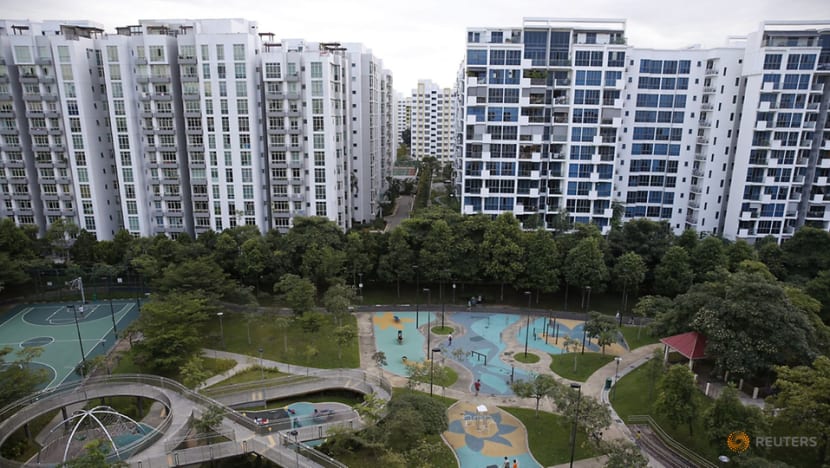New housing curbs expected, but extent of measures ‘heavy-handed’: Analysts

A view of private residential homes and executive condominiums in Singapore. (File photo: Reuters)
SINGAPORE: The new property cooling measures announced on Thursday (Jul 5) were not entirely unexpected given the recent euphoria in the housing market, but the speed and timing at which the measures were introduced as well as the extent of the curbs were “heavy-handed”, some analysts told Channel NewsAsia.
Among the curbs are a 5 percentage point hike in Additional Buyer's Stamp Duty (ABSD) rates for citizens and permanent residents (PRs) buying second and subsequent homes, as well as a 5 percentage point tightening for loan-to-value limits for all housing loans granted by financial institutions .
The measures - which the Government said were made to cool the property market and keep price increases in line with economic fundamentals - are expected to have the largest impact on the en bloc market as well as the private residential market, the analysts said.
“The Government has been keeping a watchful eye on the market for some time, with the slew of en bloc sales, record breaking land prices and strong residential price recovery with some new launches at record prices. So the measures were not unexpected,” said Ms Ong Choon Fah, CEO, research and consulting at Edmund Tie & Company.
Multiple rounds of cooling measures were introduced between 2009 and 2013 to rein in the market, although some curbs – including the seller’s stamp duty holding period and rates – were eased in March last year.
This helped to curb prices, which went on a decline for nearly four years, although they started rising again in the third quarter of last year.
Official data released on Monday showed that private home prices jumped by 9.1 per cent year-on-year in the April-to-June period, with analysts predicting that prices could soon recover to 2013 peak levels.
Two days later, Mr Ravi Menon, the managing director of the Monetary Authority of Singapore (MAS) called for the need for caution amid the “euphoria” in the market.
“After yesterday’s remarks from MAS’s Mr Menon, we sort of expected that the Government may step in; but did not expect it to be so immediate," said Mr Eugene Lim, key executive officer at ERA Realty Network.
"After all, it was a warning for buyers to be cautious and not overstretch and many thought the Government would let market forces dictate the pace for the time being,”
He added: “However, the Government may have brought this forward as they are expecting things to worsen should the US-China trade war gathers pace (impact on Singapore’s economy) and also interest rate increases over time."
'DRACONIAN AND HEAVY-HANDED'
Some analysts have lamented the timing and extent of the measures, saying that the curbs came just as launch and sale activities were starting to pick up.
They also said that the market would have adjusted and found its equilibrium even without the new curbs.
"It has caught many by surprise because there have been signs that higher prices have lowered affordability and slower take-up rates for some new launches," said Ms Christine Li, senior director of research at Cushman & Wakefield Singapore.
"The Government could have waited for further indicators to assess the market before pushing out another round of cooling measures," she added.
Mr Nicholas Mak, executive director of ZACD Group, added that he felt the measures were "heavy-handed" and "draconian".
"This round of cooling measures is heavy handed ... Introducing these draconian measures when the residential property market is barely into its first year of recovery is like strangle the baby in the cradle," Mr Mak said.
"If there is no Government interference, the market will adjust to find its equilibrium. However, this new round of curbs will reduce home buying demand, especially among investors."
He added: "As developers have a five-year deadline for their projects, they cannot hold back the launch of their projects for too long. Hence, this round of cooling measures could even hasten the market oversupply."
Mr Ku Swee Yong, CEO of International Property Advisor (IPA), said as well that he thought the extent of the measures were "heavy-handed".
"We thought that stamp duties could maybe increase by 2 per cent. We didn’t know that it would be 5 per cent across the board plus 5 per cent on developers and then on top of that 5 per cent reduction in borrowing," he said.
"You are not only making it more expensive to buy, you are also making it tougher for the borrower," he added.
DEVELOPERS AMONG THE HARDEST HIT
The measures are expected to hit developers, collective sales and buyers of second homes the hardest.
Singaporeans buying a second home will now pay ABSD of 12 per cent instead of 7 per cent previously, and 15 per cent for their third and subsequent properties. Stamp duty for Singaporeans and permanent residents buying their first homes remain unchanged.
With ABSD increased by 5 percentage points for foreigners as well, the revised duty of 20 per cent could make them reassess the viability of buying Singapore properties, said Mr Tan Tee Khoon, executive director and head of residential project marketing at Knight Frank.
The additional 5 per cent ABSD introduced for developers buying residential properties for development could raise the cost of land acquisition, reduce the bullishness of tender bids and deflate the en bloc sale market further, analysts said.
This means developers will have to pay upfront an ABSD of 5 per cent, which cannot be remitted, when they purchase en bloc properties for redevelopment.
"The direct implication will therefore be on the purchase price of these en bloc properties. Developers will have to factor in the higher acquisition costs and are therefore likely to offer lower prices for en bloc purchases," said ERA's Mr Lim.
Singapore has seen a flurry of en bloc deals recently; last year, 37 en bloc tenders worth more than S$8.7 billion were awarded.
The largest collective sale this year was Pacific Mansion at River Valley Close, which sold for S$980 million. On Wednesday, Horizon Towers at Leonie Hill was launched for sale, with the owners setting a reserve price of S$1.1 billion.
"The en bloc windfall won't be such a large windfall anymore," said IPA's Mr Ku.
"I’m just hoping that those en blocs that were previously announced and committed will not be broken ... I hope the developers won't back out of it."















